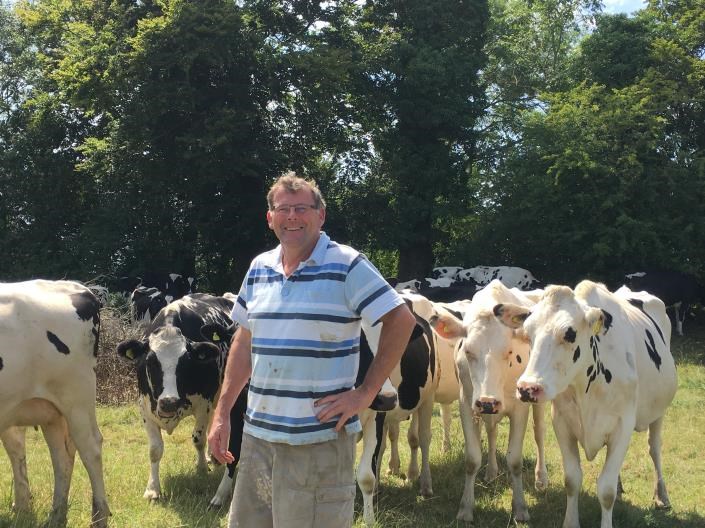Animal welfare is a very important topic in the dairy industry.
Dairy cows need to be looked after and should have a good lifestyle. To assess the welfare of dairy cows, we need to look at their living conditions, their health and any injuries or illnesses they might have.
In this article, we will talk about the different issues to look out for and what you can do to improve their welfare. For more information, makes sure to give us a call. We are an experienced independent dairy consultancy with years of experience helping dairy farmers like you.
The main problems that can occur for dairy cows are lameness and mastitis. Let’s understand these in more detail:
Lameness in cows
Lameness is when an animal has an injury or illness that stops it from moving around properly. It’s considered one of the biggest issues when it comes to cow welfare. It can be painful and can affect a large number of animals in the herd. Lameness in cattle can affect individual animals differently and usually stems from pain in one or more of the cows’ limbs. This pain not only affects how the cow moves but it can also adversely affect its productivity.
As dairy consultants, we have seen this issue many times and we recommend ensuring that cows are closely watched for any potential signs of lameness.
Mastitis in cows
Mastitis is an infection of the udder, which can cause pain and distress for the cow. The infection is typically from bacteria and the udder becomes inflamed. According to the RSPCA*, as many as 40-60 cows will suffer this in every 100 cows.
Effects of mastitis in cows
The impact of mastitis on dairy herds and dairy farms can be significant. As well as the pain the animal endures that is associated with this cows disease, it can reduce your farms milk yield as well as the quality of the milk. In some cases you will need to discard the lower grade milk entirely. Other effects mastitis has on dairy herds is the lower fertility rate in cows, so all in all cows with mastitis produce less milk, have lower fertility and therefore give birth to fewer calves and cost you, the farmer, increased veterinary bills.
Other issues
There are various other issues to be aware of when it comes to cow welfare. An independent dairy farm consultant can work with you to address issues as they rise.
Here are some further examples of what to look out for:
Stress during the transition period
In the crucial weeks before and after calving, a cow can become stressed, creating further issues. This can be a demanding time so it’s important to pay extra attention to their welfare.
Making sure cows are comfortable with their environment is critical as well as providing them with good nutrition. A safe, comfortable environment with healthy nutrition will help reduce stress.
Lack of lying down
Cows require plenty of time to lay down in comfort. If they don’t get this then there is a risk of increased stress levels. Remember, it’s not just about how much time they spend lying down, it’s also about how comfortable they are.
Need help improving the effectiveness of your dairy farm?
Douglas Green is an independent dairy farm consultancy offering expert advice for dairy farmers. If you need help, give us a call today.
Below are also some answers to frequently asked questions:
Yes, we do. As a dairy farm consultants working throughout the UK,we take cow welfare and how that can impact your business seriously. Get in touch by calling 01666 817 278 to find out more.
Dairy farm consultants provide a full range of support to help you.
At Douglas Green, we provide advice on how to improve processes and make your dairy business more profitable. We also provide support any various issues that a dairy farm can encounter, from applying for grants and loans to cow welfare and how to improve processes.
Find out more about our dairy consultancy and how we can help your farm business grow.
The milk market is volatile and scientists across the globe agree that animal welfare is inextricably linked to the welfare of farmers.
Stress and poor welfare in farm animals increases the transmission and virulence of a number of zoonotic diseases, and stressed animals during transport and slaughter often release more pathogens. Protecting the welfare of farm animals can therefore be an important factor in decreasing the spread of disease.
To fully appreciate the amount of work that goes in to dairy farming, you have to do it right. The welfare of cattle must be taken seriously too. The top welfare issues that we can see for dairy farmers to address, result from the inadequate intake of colostrum (separation from the dam), inadequate ventilation (resulting in inappropriate airflow, low or high temperatures, high humidity and poor air quality), poor floor conditions (wet floor, no appropriate bedding) and inadequate monitoring of health.
To find out how we can help you manage your dairy herd fertility and the welfare of your dairy herds, call our independent dairy consultants, here at Douglas Green.
*https://www.rspca.org.uk/adviceandwelfare/farm/dairy/keyissues



